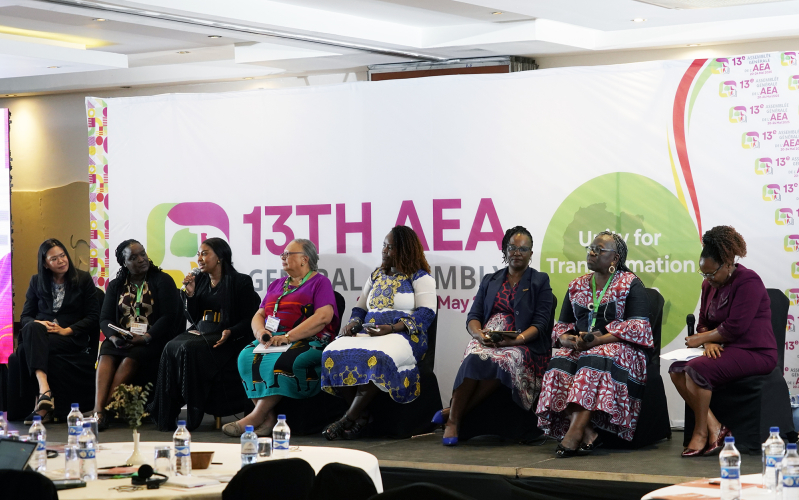
At a vibrant panel discussion during the 13th General Assembly of the Association of Evangelicals in Africa (AEA), prominent women leaders from across the continent and beyond issued a united call for greater inclusion in church leadership, emphasizing the need for biblical equality, digital relevance, and structural reform to fully engage both women and the next generation.
The discussion, moderated by Irene Kibagendi, executive director of the Pan-African Christian Women Alliance (PACWA), was held under the theme “Breaking Barriers and Advancing Representation of Women in Leadership.” The afternoon session brought together an intergenerational and multicultural panel of women with experience in theology, humanitarian work, governance, and grassroots ministry.
The panel focused on four key issues: the underrepresentation of women in church leadership, the misapplication of Scripture in excluding women, the importance of engaging younger generations digitally, and the need for institutional change within African evangelical structures.
Women make up a larger percentage of the Church, yet are underrepresented in leadership
A recurring theme throughout the session was the wide gap between women’s participation in church life and their visibility in leadership. Women make up the majority in many African congregations—often estimated at 60%—yet occupy only a small fraction of leadership roles. Several panelists noted that despite significant contributions to church ministries, women are often relegated to informal or supportive functions and excluded from decision-making forums.
Kibagendi reflected on her own experience serving as the only woman on the board of the Evangelical Alliance of Kenya (EAK), where she initially felt out of place but was eventually able to help open additional seats for other women. Other panelists echoed the need for proactive policies to ensure women are not just included but empowered to lead.
Rev. Esme Bowers, president of the Evangelical Alliance of South Africa and Director of Church Engagement at the World Evangelical Alliance, observed that leadership in the church must be rooted in servanthood, not power or position. She emphasized that women are fully capable of such servant leadership but are too often kept at the margins by tradition and institutional inertia.
The challenges: Misuse of Scripture and cultural barriers
A significant portion of the discussion addressed how misinterpretation of Scripture—often shaped by patriarchal cultural norms—has hindered women’s advancement. One panelist from Mozambique argued that the primary barrier is spiritual in nature, rooted in theological misconceptions and resistance to the Holy Spirit’s work through women.
Other speakers noted that harmful cultural practices and gender norms have been absorbed into church structures, making it difficult to distinguish between what is truly biblical and what is cultural tradition. Panelists cited examples such as gender-based violence, female genital mutilation, and stigmatization of menstruation as issues where cultural silence has led to theological complicity.
Participants called for renewed biblical literacy, urging churches to revisit Scripture with open hearts and a commitment to justice and equality. One of the panelists reminded the audience that Jesus consistently elevated women, breaking social taboos to affirm their dignity and purpose. She emphasized that equality in leadership is not a modern innovation, but a restoration of the gospel’s original intent.
Urgent need to engage the digital generation
A younger voice among the panelists was that of Zimbabwean design strategist Nicole Shana, who represented the next generation. She challenged church leaders to engage more effectively with young people by adopting a digital mindset and meeting them on platforms like TikTok, Instagram, and livestream services.
Shana warned that the younger generation is no longer waiting to be invited to the table—they are creating their own spaces, often outside of traditional church structures. She urged the Church to become fluent in digital culture and to speak in ways that resonate with emerging leaders, rather than assuming that Sunday services alone are sufficient for discipleship and engagement.
The generational divide, she noted, is not necessarily theological but technological and cultural. She encouraged older leaders to model mentorship and intergenerational partnership, comparing it to the biblical passing of the baton from Elijah to Elisha.
Implementing structural reform to improve representation
The discussion concluded with several panelists calling for structural change within evangelical institutions. Bowers proposed that AEA’s own constitution should be revised to guarantee representation for women on its board—something she noted had existed in the past but has since been removed.
Dr. Peirong Lin, Deputy Secretary General of the World Evangelical Alliance (WEA), reinforced this need for institutional transformation. Reflecting on her role as one of the few women at the highest levels of global evangelical leadership, she emphasized that tokenism must be rejected in favor of genuine recognition of women’s gifts and callings.
Lin noted that being included at high-level meetings, such as those with heads of state, signals a shift—but much more remains to be done to normalize such visibility across the evangelical world.
For Lin and others, the goal is not dominance but partnership: a return to the biblical vision of the full body of Christ—male and female—working together to fulfill the Great Commission.






